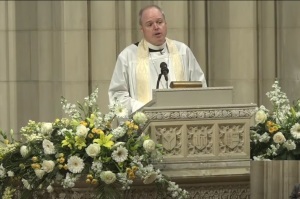Pakistani Muslims Cheer Executed Murderer of Salman Taseer Who Aimed to Abolish Blasphemy Laws

Tens of thousands of Pakistani Muslims took to the streets on Tuesday to cheer and throw flowers on the casket of an executed bodyguard who in 2011 murdered popular Punjab Gov. Salman Taseer over his plan to reform the country's strict blasphemy law.
"He lives! Qadri lives!" supporters in the city of Rawalpindi chanted, according to Reuters. "From your blood, the revolution will come!"
Mumtaz Qadri was put to death for assassinating Taseer in 2011, an action which has made him a hero for many hardline Islamists. Taseer had been accused by hardline groups of committing blasphemy himself by criticizing the law, which is supposed to protect Muslim sentiments, but according to human rights groups is often used to settle personal scores and oppress Christians and other religious minorities.
News of Qadri's execution spread on Monday, prompting demonstrations in his support in the city.
"Mumtaz Qadri is a hero of Islam. He sent to hell a person who showed disrespect for the holy [Muslim] prophet," said Tahir Iqbal Chistie of the hard-line Sunni Tehreek movement.
Other Islamic groups in the country, however, including the conservative Council of Islamic Ideology, have said that Qadri was wrong to carry out the assassination.
"No one is above the law," Mohammad Sherani of the Council said. "I respect Qadri's religious sentiments but I respect Pakistan's constitution more."
The Supreme Court of Pakistan upheld Qadri's death sentence back in October, and also retained terrorism charges against the bodyguard that had previously been dropped by a lower court.
When he was alive, Taseer stood up for some of the many Christians who have been punished by the country's blasphemy laws, including mother of five Asia Bibi, who has been on death row for years after being accused of insulting Islam.
Catholic groups in Pakistan said that the Supreme Court's decision was the right one, even if Catholics oppose the death penalty.
"Given the case and the context, we expected this result, even if we as Catholics and human rights activists do not approve of the death penalty," Peter Jacob, director of the Centre for Social Justice, said at the time.
"The decision shows after all that the Supreme Court is independent and free from fundamentalist influences. The ruling will reopen the debate closed after the high-profile murder."
Ongoing blasphemy cases in Pakistan also include the death sentences of a disabled Christian man and his wife, who were punished for allegedly sending blasphemous text messages to an Islamic cleric.
Shafqat Masih, who is paralyzed from his waist down, said that he is seeking bail in February over his deteriorating health.
"I have developed bedsores and I may die in jail as there is no possibility of a better treatment there," Masih said. "There are serious contradictions in witness accounts against me and my wife and we are hopeful of an acquittal on our appeal."





























